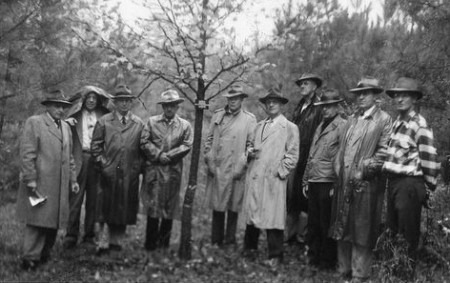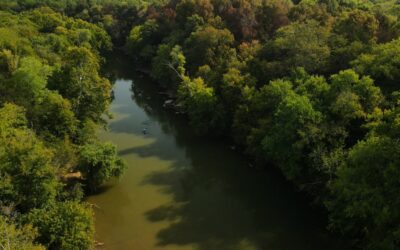Adapted from Dr. Marge Davis’ “Sportsmen United: The History of the Tennessee Conservation League”
The Tennessee Conservation League (now the Tennessee Wildlife Federation) was formed on Tuesday, Feb. 12, 1946, at the Read House Hotel in Chattanooga. The crowd included 53 Tennesseans, plus two guest speakers from the game and fish programs of neighboring states.
Among the members were notables like Nash Buckingham, Lou Williams, Paul Bryant, and Z. Cartter Patten III. They were sports writers, hunters, fishermen, and conservationists, and they had a common goal—to put in place a system for wildlife management in Tennessee that would rely less on politics and more on sound biology.
Williams, a noted outdoors columnist, wrote in his 1971 history that Ernest Peckinpaugh emphasized the need for an organization that stood for more than wildlife conservation.
“He envisioned one which would concern itself with the overall aspects of natural resource conservation,” Williams wrote of Peckinpaugh. “He wanted the new group to advocate programs which would encompass soil, water, forests as well as wildlife. A number of others in the small, determined group felt the same way.”
The League was incorporated, with fifteen members putting up $10 each in seed money for the charter fee, postage, telephone calls, and other incidental expenses. Every sportsmen’s club in the state was notified of the organizational meeting. At that first meeting, the two guest speakers were Charlie Elliott, director of Georgia’s game and fish program, and Tom Ford, an official from Alabama. Both represented states where the commission form of game and fish administration was already in effect—Alabama’s since 1939 and Georgia’s since 1943.
Williams, a Natural Leader
It was clear that Lou Williams would be the group’s leader, and much of the first meeting was spent voting on the nine pages of proposed bylaws. Most were adopted as written, but one drew “much discussion”—the section on goals and objectives. For the most part, this section was fairly predictable: to conserve the natural resources of Tennessee, to sponsor educational programs, to cooperate with affiliated clubs, and so forth. A number of items had to do with legislation, including a pledge to pass favorable game laws and another to oppose “any amendment or act…that may deprive a law-abiding citizen the right to possess, own or bear firearms.” (Removed in 1951 when the League applied for tax exemption). Nowhere, however, did the section say anything about removing the fish and game department from political interference and patronage. This was added as an explicit purpose, only after much wrangling among members.
Lou Williams told the group it was his “burning desire” to get the Conservation Department itself out of politics. He respected Commissioner Paul Mathes and the rest of his department, but he said they were all “hogtied” by political pressures. In 1946, Game and Fish was still a division of the state Conservation Department, as it had been since 1937. When the issue finally came to a vote, the motion called for the political independence of the entire department, not just its Game and Fish Division. The motion passed unanimously, and “the removal of the Conservation Department of the State of Tennessee from political influence” was inserted near the top of the list of objectives. If the motion helped solidify the League’s agenda, it also gave the next morning’s newspapers something far more meaty to report than merely the founding of a new hunting and fishing club. On Wednesday, most of the state’s major dailies announced the League’s “Campaign to Remove State Conservation Department from Political Control.”
An editorial in The Chattanooga Times read: “The Tennessee Conservation League will do this state a great service if it succeeds in having the state as a whole considered from a nonpolitical standpoint in conservation. States which seek to become nationally known recreation centers and which seek to attract true sportsmen must have a nonpolitical policy which conservationists and sportsmen throughout the state would be glad to advance.”
Membership Grows
Through 1946, the League built a base of clubs and individuals that boosted the membership into the thousands. When the first Annual Meeting was held in February 1947, more than a hundred delegates attended. The campaign to reform Game and Fish would dominate discussion at the meeting, and the League’s activities for the next two years.
The group was “ready to blow off the lid” during the current legislative session, and unwilling to wait until the next one in 1949.
But Williams urged caution, and reminded the group that the organization was “not yet strong enough to live through a serious controversy.” Infinite wisdom, of course, but mighty unpopular that Friday night.
It was a critical test of Williams’ leadership, but he stood firm. By the next morning, the mood had calmed. Most of the dissenters were now willing “to accept the fact that a year or two must pass before there would be any appreciable movement.” Yet the League was already moving forward.
On Saturday morning, attorney and legislative committee chair Karl Steinmetz argued that if the League wanted to have a model game and fish law ready by 1949, it had better start drafting it now. The committee promised that the draft would be ready for the 1948 convention, but in fact it was ready much sooner. On Nov. 14, 1947, Lou Williams called a special meeting of the executive committee to review the proposed model law.
Bill Calls for Game and Fish Commission
The League was calling for an independent Game and Fish Commission. After looking more carefully at the structure and makeup of the Department of Conservation, the board had decided it would be impractical to try to change the entire TDOC.
The bill called for nine commissioners instead of five, three per grand division of the state. And it granted an unprecedented degree of oversight to the sportsmen.
Steinmetz’ bill was much like the other wildlife commission bills of the period. It gave the commissioners the authority to hire and fire a director, set seasons and bag limits, and acquire land. It stipulated that the commission be entirely self-supporting, neither receiving money from nor paying money into the general fund. The commission would operate entirely on its own resources, whether license fees, fines, permits, leases, or federal allocations. These monies would go into a Game and Fish fund, where they would be held “separate and apart” from any other use by the state. The bill gave the commission sole power to fix the budget; to enforce game and fish laws; and to buy lands for game farms, fish hatcheries, and hunting grounds.
At the 1948 annual meeting in Nashville, the members moved to adopt the draft with only two minor changes. The draft was officially in the pipeline, but getting the model law ready for the Legislature was only half the job. League officers began at once to plan a “concentrated and skillful statewide campaign” in support of the proposed law. They flooded the newspapers with articles and press releases, pushed the law in weekly outdoor columns and wrote letters of support in the editorial pages. They recorded radio spots, set up a speakers’ bureau, appeared before civic groups, and, in general, tried to make sure that every sportsman in the state understood what the law was all about.
They were not necessarily preaching to the choir, either. While most sportsmen supported the commission idea, some were bitterly opposed. Nevertheless, the list of affiliates and individual members grew to nearly 10,000—no small potatoes to a legislator or office-seeker.
Even if wildlife protection were not a popular issue, it would be hard, if not impossible, to ignore such a delegation.
After a year-long grassroots lobbying effort, the vote came in late February, with the model law passing 79-2 in the House and 26-1 in the Senate. On Feb. 25, 1949, it became Chapter 50, Public Acts of 1949, creating what was officially designated the Board of Conservation for Game, Fish, and Wildlife.
Folks in the League were well aware that their commission would be challenged. For now, however, they simply savored their victory.




